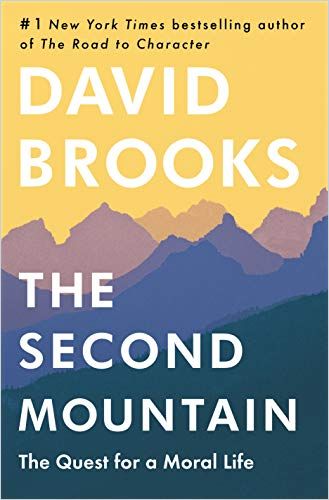New York Times op-ed columnist David Brooks delves into what satisfies the ego versus what satisfies the soul and offers detailed guidance regarding the latter.

Follow Your Soul
The dominant ethos of the early 21st century is “hyper individualism”: seeing life’s purpose as attaining independence, self-fulfillment and happiness. Yet this trend spawns various spiritual and social afflictions, including loneliness, mental illness, substance abuse, a lack of purpose, and fragmented families and communities. Instead, says New York Times op-ed columnist David Brooks, prioritize relationships and commitments.
Freedom and Professional Achievement
People initially aspire to ascend the “first mountain” in life by pursuing the social and cultural norms: going to university, getting a good job, participating in respectable society and enjoying personal security. First mountain values focus on the ego at the expense of generosity, compassion and love.
By conceiving of ourselves mostly as autonomous selves, we’ve torn our society to shreds, opened up division and tribalism, [and] come to worship individual status and self-sufficiency.David Brooks
When society prioritizes self-interest and freedom, people suffer alienation. The egotistical vision holds that a person is autonomous, achievement is the most meaningful aim, and that people are free to invent how they live. This self-realization often leads to desolation.
Higher Purpose
People who lose their sense of purpose tend to medicate themselves with a new distraction or excitement – often, romance or substance abuse. People mask their crises by mindlessly plodding forward or indulging in self-pity.
People [no longer] believe they are part of some larger story they can believe in and dedicate their lives to.David Brooks
A significant percentage of middle-aged Americans suffer chronic loneliness, which fuels a rising suicide rate, an opioid epidemic, an inability to feel part of a larger narrative, and a tribalism of ideology, ethnicity or religion.
Overcoming Crises
Suffering helps a person understand the insignificance and triviality of a self-centered life. Transcending such a crisis requires letting go of previous selves, reflecting deeply and allowing a new self to emerge.
When people struggle to get past a crisis and its ramifications, Brooks says, they gain acute awareness of their true nature and needs. Today, education and employment teach that cognitive reasoning capacities are the most important skills a person can develop. Overcoming crises helps people understand that rationality is by no means their most important aspect.
Pain helps us see the true size of our egotistical desires.David Brooks
Your most important aspect is your “desiring heart.” Emotions give life significance and value. The soul, crucial to the self and consciousness, has ethical value and responsibility. The heart seeks union with a beloved person or thing; the soul seeks goodness.
Interdependence
People aspire to personal happiness, revere autonomy, and place primary importance on career and accomplishment. They invest in achieving career goals, affluence and status as the meaning of life.
If the heart yearns for fusion with another person or a cause, the soul yearns for righteousness, for fusion with the good.David Brooks
But, those who move from individualism toward the second mountain can see the world anew. Those who climb life’s second mountain embrace their connections and dependence on other people. They regard giving to others and loving them as the most important activities in life.
Commitments.
People commit to people, things and activities they value and love. Commitments are promises of devotion and love. Commitments are categorically different from contracts; commitments don’t pursue cost-benefit rewards. Commitments transform people.
Commitments give an individual a coherent, well-defined, easily articulated identity. A deep commitment to a marriage or a cause solidifies and shapes that identity. Commitments grant an urgent, higher sense of purpose. People in affluent, peaceful countries often lack a sense of purposeful living, while those in tumultuous, conflict riddled countries have an urgent sense of purpose because they, first, make a fierce commitment to survive.
People on the first mountain are free from constraints; people moving up the second mountain find that their commitments liberate them. They connect to valuable practices and habits. Destructive compulsions such as substance abuse are much less tempting. Commitments develop and deepen moral character. As with your identity, your moral character cannot evolve in isolation.
Vocation
A vocation isn’t a career. A career means a job that suits you and provides the best possible return on your investment of time and effort. You plan how to move up the ladder and reap financial and social rewards. People don’t pursue a vocation because it pays well; they pursue a vocation because it is their calling.
The summons to vocation is a very holy thing. It feels mystical, like a call from deep to deep.David Brooks
Committing to a vocation feels mystical or religious. Something transfixes you, and may shape the rest of your life. Fortunate people will find a mentor who teaches and demonstrates excellence in their vocation and shows them how to overcome obstacles. A complete, fervent commitment to a vocation becomes more important than ego and serves a higher good.
We, Not I
Community is a complex web of personal relationships consisting of emotionally rich, trusting relationships among people who share a sense of place. Today’s neighborhoods and communities are rarely like that. People often don’t know or help each other in simple ways.
People who are left naked and alone by radical individualism do what their genes and what the ancient history of their species tell them to do: They revert to tribe.David Brooks
People on the second mountain, whose deepest commitment is to others and not themselves, build communities.
“Relationalism”
The two mountains represent different ethical paths. The first mountain prioritizes ego needs, desires and aspirations. The second mountain prioritizes relationalism – relationships and commitments to other people and to community.
When…relinquishment of the ego self and emergence of the heart and soul [have] happened, people are ready to begin the second mountain.David Brooks
Relationalism embraces heart and soul and offers a route to meaning and purpose. Embrace it to build a substantial and satisfying life.
Familiar priorities
Despite the worthiness of his message, David Brooks’ proselytizing for an egoless life of commitment does sometimes slip into sermonizing. The softer side of Brooks’ description of the heart, the soul and the need for connection will ring familiar to readers of, for example, Brené Brown, while his overall approach is more conceptual and less therapeutic. To further explore the traditional values Brooks espouses, see also his book The Road to Character.
David Brooks, a New York Times columnist, also wrote The Social Animal: The Hidden Sources of Love, Character, and Achievement; Bobos in Paradise: The New Upper Class and How They Got There; and On Paradise Drive: How We Live Now (And Always Have) in the Future Tense.







